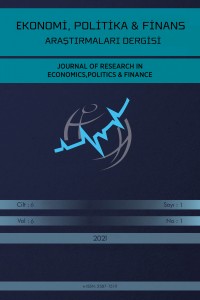Abstract
Bu makale, Suriye'nin kırsal sorununu anlatmak için politik ekonomi yaklaşımını kullanmaktadır. Makale, 1970'ten beri ortaya çıkan üretim, sınıf oluşumu ve iktidar ilişkilerinin izini sürmektedir.1963’te iktidarı ele geçiren BAAS, toprak sahibi sınıfın geleneksel toprak sahibi sınıfın egemenliğiyle karakterize edilen liberal döneme son vermiştir. Popülist BAAS dönemi, kırsal kesimin popülist dönüşümü ile nitelenen radikal dönem ve devletin radikal kulvardan kısmen ayrıldığı ve tarım politikasının rejimin varoluş aracına dönüştürüldüğü Makyavelci dönem olarak ayrılabilir. Ardından piyasaları liberalleştirmeyi ve üretim ilişkilerini yeniden yapılandırmayı amaçlayan neoliberal dönem geldi. Makale, 2011'de Suriye'yi saran isyana kırsal katılımın kökenlerini inceleyerek son bulmakta ve kırsal kesim ayaklanmasının 2007-2010 arasındaki kuraklık ile açıklanamayacağını, bunun yerine nedenlerin yönetici rejimin kuruluş ve kalkınma stratejilerinde aranması gerektiğini tartışmaktadır.
References
- Not sure what is this Should I tell you who are the referees?
Abstract
This article employs a political economy approach to offer a narrative of the rural problem of Syria. It traces the relations of production, class formation, and power as they unfolded since 1970. The Baath takeover in 1963 ended forever the liberal era which was characterized by the dominance of the traditional landlord class. The populist Baath era can be divided into a radical period characterized by the populist transformation of the rural sector, and a Machiavellian period; partially retreated from the radical course and transformed the state agrarian policy into a regime survival tool. Then came, the neoliberal era, which aimed at liberalizing markets and restructuring production relations. The paper concludes by examining the roots of the countryside participation in the revolt engulfed Syria in 2011. It argues that the rural revolt could not be explained by the drought of 2007-2010; rather the reasons are to be sought in the state-building and development strategies chosen by the ruling regime.
References
- Not sure what is this Should I tell you who are the referees?
Details
| Primary Language | English |
|---|---|
| Subjects | Economics |
| Journal Section | Makaleler |
| Authors | |
| Publication Date | April 30, 2021 |
| Acceptance Date | January 20, 2021 |
| Published in Issue | Year 2021 Volume: 6 Issue: 1 |


